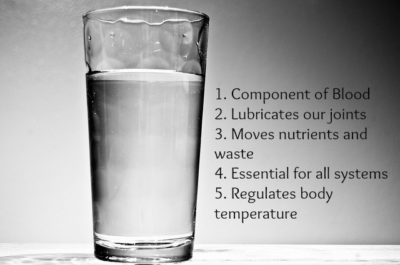“Thousands have lived without love, not one without water” – W.H. Auden
Now that’s pure logic no one can argue with! 60% of the human body is made of water, making it one of the prime components of our body. A human being can survive close to 3 weeks without food, but not more than a few days without water. Water isn’t just a component of blood; it also lubricates our joints, provides a means for the movement of nutrients and waste and is essential for all bodily functions. But an often overlooked function of water is temperature control – water, in the form of sweat, helps to regulate our body temperature through sweat. But in this process, you can lose water from your body, making you dehydrated.
As you know, summers are super-sweaty months, especially in India where the humidity is very high. This results in some severe water loss, particularly if you spend a lot of time outdoors or engaging in intense physical activity. At such times, the regular ‘8 glasses a day’ is not enough, and we are often left more dehydrated than we think. Apparently, by the time you are feeling thirsty, you have already lost 1% of your body water. Any more and you can end up with some serious trouble.
So ensuring that you are always hydrated is very important, more so in the hot season. To make things easier, here are 10 ways to stay hydrated in summer, so read on!
1. Drink a glass of water before every meal
This is a great tip, not just for hydration, but for portion control as well! While setting your table, set out filled glasses of water for everyone, so you’re tempted to drink up before starting your meal.
2. Avoid alcoholic drinks
Remember the headaches associated with a hangover? It’s because of dehydration. Alcohol is a diuretic, making people urinate more, in turn dehydrating the body. If you have consumed alcohol, drink lots of water to make up for the loss.
3. Keep a bottle of water handy always
Whether you’re out and about or working indoors at your desk, keep a bottle of water handy. The sight of the bottle on your desk will remind you to keep sipping, keeping dehydration at bay. When you’re outside, you’ll always have something to drink before you get thirsty.
4. Cut down on caffeine
Yes, you probably love your 6 cups of coffee a day, but in summer, it’s best to cut down on the caffeine. Like alcohol, caffeine is also a diuretic, although not as severe. A cup or two of caffeine shouldn’t make a difference, but otherwise, it’s best to switch to other drinks.
5. Opt for variety
To stay hydrated, you need to consume sufficient fluids, which can be beverages other than water. Fresh fruit juices, buttermilk, coconut water and smoothies are all great options to stay hydrated in summer. You can also add a slice of lemon in plain water for some zing.
6. Eat water laden foods
You don’t have to drink to rehydrate, you can also eat your way to hydration! Eating water laden foods like cucumbers, melons, strawberries and celery helps restore the body’s water balance and also adds lots of fiber to your diet.
7. Avoid the sun during peak hours
This tip has many advantages for your health, besides hydration! The sun is at its hottest between 10:00 A.M. and 3:00 P.M., which also means that it is the most dehydrating time of the day. Stay indoors during these hours to avoid extreme water loss.
8. Hydrate before and after a workout
Just a pre and post workout snack is necessary, so is a drink before, during and after your workout. Exercising without being properly hydrated can put a lot of strain on the body and the workout will not reap the desired results.
9. Workout during cooler times
The ideal times to workout during summers are early mornings and late evenings, when the weather isn’t as humid and there is a lower chance of getting dehydrated. Avoid exercising during mid-day as it can be very draining.
10. Keep germs at bay
Summer is a time when germs spread quickly and food spoils faster. Eat clean and fresh at all times to avoid getting illnesses like diarrhea which can dehydrate a person in a very short time. In case you have severe loose motions, consult a doctor who may give you IV fluids.
Common signs of dehydration include fatigue, nausea and headaches, and you shouldn’t wait till you reach that stage to rehydrate. A great way to know if your water intake is sufficient is to check the color of your urine – a pale yellow color is normal, while darker means dehydration. Of course, what comes out will depend on what goes in your body!! Stay hydrated, stay healthy!
Image Sources
Follow Me On…
FACEBOOK | TWITTER | PINTEREST |elephant journal
*All of my reviews are based on my own personal experiences with the brand/products. If it is a sponsored post, it is indicated. Most of the brands and products reviewed are what I have tried and tested and truly recommend! All Photographs are (C) Pratibha unless stated otherwise.*


I prefer carrying a water bottle all the time in my hand , it helps me a lot to hydrate myself. Good and valid pointers Fab!